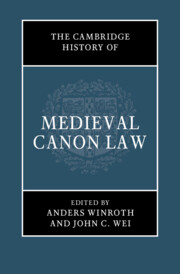Book contents
- The Cambridge History of Medieval Canon Law
- The Cambridge History of Medieval Canon Law
- Copyright page
- Contents
- Figures
- Maps
- Tables
- Contributors
- Acknowledgments
- Abbreviations
- Medieval Canon Law: Introduction
- Part I The History of Medieval Canon Law
- 1 The Early Church
- 2 Early Medieval Canon Law
- 3 Canon Law in the Long Tenth Century, 900–1050
- 4 The Age of Reforms: Canon Law in the Century before Gratian
- 5 The Reinvention of Canon Law in the High Middle Ages
- 6 Canon Law in a Time of Renewal, 1130–1234
- 7 The Late Middle Ages: Four Remarks Regarding the Present State of Research
- 8 The Late Middle Ages: Sources
- 9 The Canon Law of the Eastern Churches
- Part II The Sources and Dissemination of Medieval Canon Law
- Part III Doctrine and Society
- Bibliography of Primary Sources
- Index
- References
7 - The Late Middle Ages: Four Remarks Regarding the Present State of Research
from Part I - The History of Medieval Canon Law
Published online by Cambridge University Press: 13 January 2022
- The Cambridge History of Medieval Canon Law
- The Cambridge History of Medieval Canon Law
- Copyright page
- Contents
- Figures
- Maps
- Tables
- Contributors
- Acknowledgments
- Abbreviations
- Medieval Canon Law: Introduction
- Part I The History of Medieval Canon Law
- 1 The Early Church
- 2 Early Medieval Canon Law
- 3 Canon Law in the Long Tenth Century, 900–1050
- 4 The Age of Reforms: Canon Law in the Century before Gratian
- 5 The Reinvention of Canon Law in the High Middle Ages
- 6 Canon Law in a Time of Renewal, 1130–1234
- 7 The Late Middle Ages: Four Remarks Regarding the Present State of Research
- 8 The Late Middle Ages: Sources
- 9 The Canon Law of the Eastern Churches
- Part II The Sources and Dissemination of Medieval Canon Law
- Part III Doctrine and Society
- Bibliography of Primary Sources
- Index
- References
Summary
The term “Classical Canon Law” emerges rather late in the historiography.* Apparently of French origin, it appeared in several book titles from the 1930s onwards as “Droit classique de l’Église” (The classic law of the Church). Gabriel Le Bras may take credit for giving the term international recognition through the monumental multi-volume work on the history of law and institutions in the western Church. In the first volume (1955) of this collective work, Le Bras divided the entire development of western canon law into three periods. He assigned the name “l’âge classique” (the classical age) to the middle period, spanning well over 200 years from the time of Gratian’s Decretum (c. 1140) to the outbreak of the Great Western Schism (1378). Hans Erich Feine was clearly influenced by Le Bras when he replaced the previously neutral section title “IV. Periode: Das kanonische Recht” (The canon law) of his influential Kirchliche Rechtsgeschichte in its fourth edition (1964) with “Das klassische kanonische Recht” (The classical canon law).
Keywords
- Type
- Chapter
- Information
- The Cambridge History of Medieval Canon Law , pp. 108 - 121Publisher: Cambridge University PressPrint publication year: 2022

